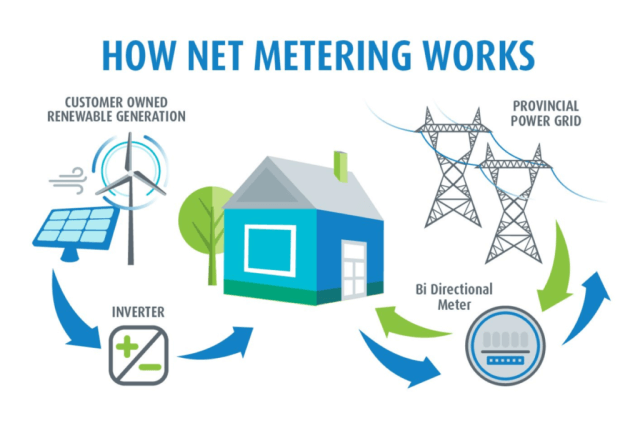
- 0316 622 5526
- Comfort Solutions Pvt Limited
Account

Net metering is a revolutionary system that allows residential and commercial solar energy users to feed surplus electricity back into the grid. This system not only helps in reducing electricity bills but also promotes the use of renewable energy sources. In Pakistan, the adoption of net metering is gaining momentum as it supports the national grid and encourages energy independence.
Net metering is a billing mechanism that credits solar energy system owners for the electricity they add to the grid. For instance, if a residential solar panel system generates more electricity than the home uses during daylight hours, the excess electricity is sent to the grid. The homeowner receives credits for this excess electricity, which can be used to offset the electricity consumed from the grid at night or during periods of lower solar generation.
In Pakistan, the National Electric Power Regulatory Authority (NEPRA) regulates net metering. Consumers with solar panels can connect to the national grid and benefit from net metering if they have a three-phase electricity connection and a system capacity between 1 kW and 1 MW. The process involves:
Net metering offers significant financial benefits by reducing electricity bills. Surplus energy generated during the day is credited, which can be used to offset consumption during non-generating periods.

Net metering supports environmental sustainability by promoting the use of clean, renewable energy. This helps in reducing carbon footprints and combating climate change.
With net metering, consumers become less reliant on the national grid and fossil fuels. This shift towards renewable energy sources enhances energy security and promotes energy independence.
The implementation of net metering in Pakistan faces technical challenges, such as the need for advanced metering infrastructure and grid compatibility. Upgrading existing infrastructure to accommodate bidirectional energy flow is essential.
While NEPRA has established regulations for net metering, policy consistency and support are crucial for widespread adoption. Continuous policy refinement and incentives can drive more consumers towards net metering.
The government of Pakistan, through various programs, offers subsidies and tax incentives to encourage solar energy adoption. These incentives significantly reduce the upfront cost and improve the ROI for consumers opting for net metering.
A homeowner in Lahore installed a 5 kW solar system, significantly reducing their monthly electricity bill. Over the first year, they saved approximately PKR 50,000 through net metering credits, achieving a payback period of about 6 years.
A textile mill in Faisalabad implemented a 100 kW solar system. The net metering arrangement allowed the mill to save over PKR 1,000,000 in electricity costs annually. The system’s payback period was 4 years, with ongoing annual savings thereafter.
The Pakistani government is actively promoting renewable energy through various initiatives and subsidies. Continued support and investment in solar infrastructure are expected to boost net metering adoption.
Advancements in solar technology, such as more efficient solar panels and improved energy storage solutions, will further enhance the benefits of net metering. Innovations in smart grid technology will also play a critical role in seamless integration.
Engaging communities and stakeholders through awareness campaigns and educational programs is vital for the success of net metering. Collaboration between government, private sector, and consumers can accelerate the transition to renewable energy.
Net metering not only empowers consumers but also supports the national grid and promotes renewable energy adoption, paving the way for a greener and more sustainable future. By understanding and leveraging net metering, Pakistani consumers can take a significant step towards a more sustainable and economically efficient energy future.
Net metering is a pivotal initiative that encourages the adoption of solar energy in Pakistan. By enabling consumers to feed surplus electricity back into the grid, it not only reduces electricity bills but also contributes to the national grid’s stability. With government support, technological advancements, and increasing awareness, net metering is poised to play a crucial role in Pakistan’s energy future. Embracing this system can lead to substantial financial savings, environmental benefits, and enhanced energy security for consumers across the country.
The minimum system capacity required for net metering in Pakistan is 1 kW.
Yes, existing solar systems can be upgraded to include net metering, provided they meet the technical requirements and regulations set by NEPRA and DISCOs.
Yes, the maximum system capacity allowed for net metering in Pakistan is 1 MW.
Net metering credits are calculated based on the difference between the electricity generated by the solar system and the electricity consumed from the grid. Surplus energy fed into the grid is credited at the prevailing tariff rates.
If your solar system generates more electricity than you consume, the surplus is fed into the grid, and you receive credits that can offset future electricity consumption from the grid.
WhatsApp us